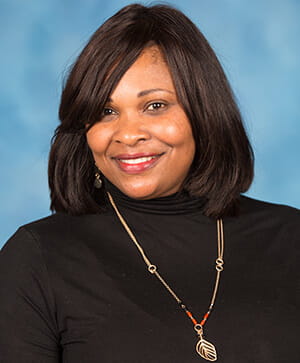
“Growing up, I didn’t have role models in the profession,” says Dr. Dixon-Saxon. “You heard of guidance counselors and camp counselors, but a professional counselor? I didn’t really know what that was.”
At the University of South Carolina, she earned a bachelor’s in journalism and mass communication. Being inquisitive and a good speaker, she thought she’d be a good reporter. However, working long hours in the aggressive, unpredictable and hyper-competitive environment of radio and TV stations was frustrating.
“I didn’t know what I wanted to do next, but I didn’t want anybody else to feel like I did,” says Dr. Dixon-Saxon. “I wanted to help people who were uncertain about what they wanted so they could take better advantage of the college experience. I had no idea what career that was.”
A chance encounter led her to a Master of Education degree in Student Personnel Services. She then found a job doing exactly what she’d hoped for in student affairs and academic advising at a small residential art school.
“As much as I loved what I was doing, some of the students had significant issues,” says Dr. Dixon-Saxon. “I fell short in providing them with the proper kind of support because I didn’t have a background in counseling.”
She left that job to pursue a PhD in Counselor Education and graduated from North Carolina State University. Dr. Dixon-Saxon began teaching for two universities, working in the counseling center, doing outpatient therapy, and conducting undergraduate assessments. It was a substantial workload for anyone. As a single parent, she knew she wanted to spend more time with her young daughter. She looked for a fulltime role that wouldn’t require her to move away from her support system, which led her to Walden.
“Because Walden’s work model includes remote positions, a lot of faculty and staff from marginalized groups have more opportunities,” says Dr. Dixon-Saxon. “Walden is an equalizer for students, too, especially with our mission of removing barriers and providing access to a high-quality education.”
At Walden, she started the MS in Clinical Mental Health Counseling program and led the effort to earn accreditation from the Council for Accreditation of Counseling and Related Educational Programs (CACREP), a specialized accrediting body recognized by the Council for Higher Education Accreditation (CHEA). CACREP accreditation ensures that the content and quality of counselor-preparation master’s and doctoral degree programs have been evaluated and meet standards set by the profession. In addition to counseling, Dr. Dixon-Saxon now oversees a range of programs from criminal justice to public policy and social work.
“One of the things I’ve learned from the profession of counseling is how to work with other people and leverage their expertise.”
As vice provost, much of her focus is on student success at a macro scale. It’s not just about how students perform in the program, but also how they prepare to be students and how prepared graduates are to be professionals in their fields. She still hasn’t lost sight of individual students though. In fact, she was one at Walden, earning a Master of Business Administration (MBA) in 2013.
“It’s important not to set aside what you have gleaned from your community and family about how to support people and have unconditional, positive regard for them,” Dr. Dixon-Saxon recommends to counseling students. “Add it to your toolkit to make you more authentic.”
Reflecting on her winding journey, she advises those working with people to engage in a lifetime of knowing who they are and what they value.
“If you don’t, you’ll think there’s only one route to get where you think you want to be,” explains Dr. Dixon-Saxon. “But, if you know what you value, and another bus comes along, you’ll recognize the opportunity.”



